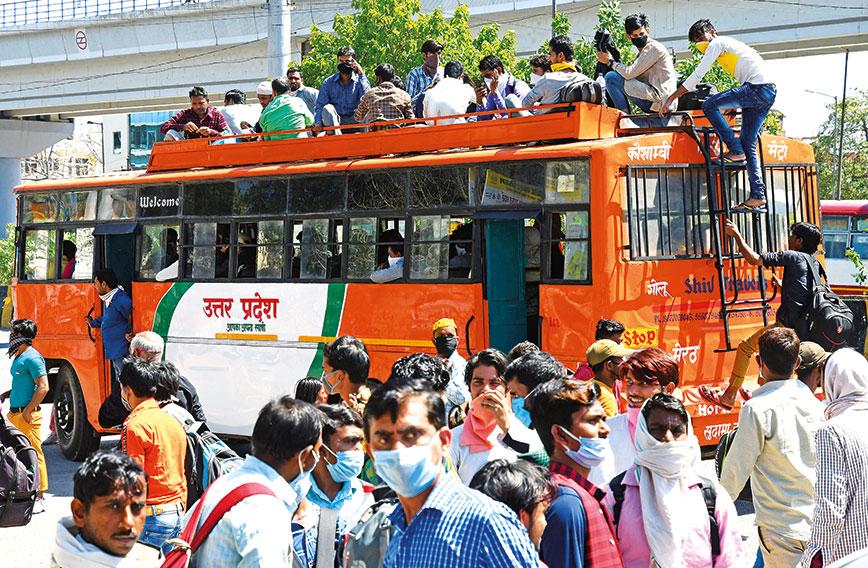

ARUN MAIRA
THE COVID-19 pandemic has put the global economy through a severe stress test. As accelerated stress tests do in medicine and engineering, revealing structural weaknesses in the systems being tested (complex human bodies, and complex machines like aircraft and motor vehicles), the pandemic has revealed dangerous weaknesses in designs of global supply chains, health systems and education systems, and in the designs of cities which could not provide the needs for sustainable incomes and healthy living for all their citizens. Millions of poor workers left Indian cities in which they were not cared for, to return to their villages from where they had come to these cities with hope for better lives. Public health systems failed to cope, even in rich countries. Foundational years of child education have been wasted around the world.
Never waste a crisis they say: crises are opportunities to make substantial reforms to put systems into better shape. The Indian economy was in crisis in 1991. The opportunity was seized for reforms and economic growth was accelerated. Reforms after the Asian financial crisis in 1997 were directed by the IMF and the World Bank. A wider global financial crisis followed in 2008 and G-7 countries stepped up to put global economic growth on track. Structural reforms after all these crises have resulted in larger gaps between wealth on top and the masses below.
After every crisis, the engines of financial growth were further improved while the rest of the aeroplane was neglected. Thus, economic structures became further imbalanced and in the pandemic they became badly disjointed. Oxfam estimates that the wealth of the 10 richest people in the world doubled during the pandemic, and two Indians climbed up the ranks of the world’s richest people, while incomes of 99 percent of humanity fell. Millions of Indians fell below the poverty line, reversing whatever gains were made earlier.
The disastrous effects of global climate change have become more visible within wealthy countries too, with unseasonal temperatures, fires, and floods in the US, Australia, and Europe. The IPCC has warned that time is running out fast. Global leaders gathered in Glasgow but could not chart an acceptable plan. They were especially challenged by the need for justice demanded by poorer countries. They have already suffered the most and should not be expected to share equal moral responsibility for humanity’s failures, to reduce the congestion of space for carbon in the atmosphere, which has been crowded out by a handful of rich countries with their pursuit of high technology, energy consuming, economic growth. India is committed to achieving global goals of overall reduction to be achieved later this century. However, millions of people in India and other developing countries, already struggling, must survive during their difficult journeys to achieve the global goals.
Principles of equity and justice must be applied in all major economic, environmental, and social reforms from now on, to create more sustainable, more inclusive and more resilient systems that will withstand further shocks, without having to throw the poor out of the ship without lifeboats, which has happened with previous reforms. Albert Einstein said, “Trying harder to solve problems with the same ideas and tools that have caused them is madness”. Flaws in the scientific industrial paradigm which has driven economic growth in the last century have been revealed. We cannot use the same scientific industrial ways of thinking, and the same forms of institutions, to get ourselves out of crises created by their overuse and misuse.
While the pandemic was raging, and the plight of the masses could not be ignored any longer, many leaders said that, after the pandemic passes, we must build a new, resilient, more inclusive, and more sustainable global system, on new foundations with new ideas. There was hope that global supply chains disrupted by the pandemic would be restored when the pandemic eased. They have been thrown into further turmoil by the sanctions imposed by the West in the Ukraine crisis. Institutions created post the Second World War to ensure global peace have failed. Flaws in their architecture — the Security Council, World Bank, IMF, and WTO — in which power to fix the rules of the game lies with the most powerful, who will look after themselves first before the rest, have once again been revealed.
Paradigms are hard to change. Those who have led the creation of the prevalent paradigm with power vested in its design will resist fundamental changes. They fear their loss of power. At the international level, the US, with the largest defence forces in the world and control of the dollar, the global currency of trade, is reluctant to lose its power to control geo-politics and the global economy. Within the US, and other countries too, the rules of the game are influenced by big investors and large corporations. Rich countries control “intellectual property”. Even ‘socially’ minded governments are obliged to go along with these rules. Thus, the masses already left behind fall even further behind after any crisis-induced reforms, as they did after the last global financial crisis.
The time has come to step out of the rut of how things are usually done, and best practices of the present paradigm, to design new institutions and fundamentally new solutions that will create more equitable and resilient systems. The designs of these systems must be founded on the perspectives of the poorest and most powerless citizens within them, not just the ideas of experts, investors of capital, and policy makers on top.
This is an introduction to the challenges before us. In my pieces to follow, I will discuss designs of cities, education systems, and health systems to create more inclusive and sustainable societies. In them, we will listen to the voices of the presently powerless. In fact, I have urged Rita and Umesh Anand to change the tagline of my column for this purpose from “Let’s Talk” to “Time to Listen”.
Arun Maira author of A Billion Fireflies: Critical Conversations to Shape a New Post-pandemic World
Comments
Currently there are no Comments. Be first to write a comment!



